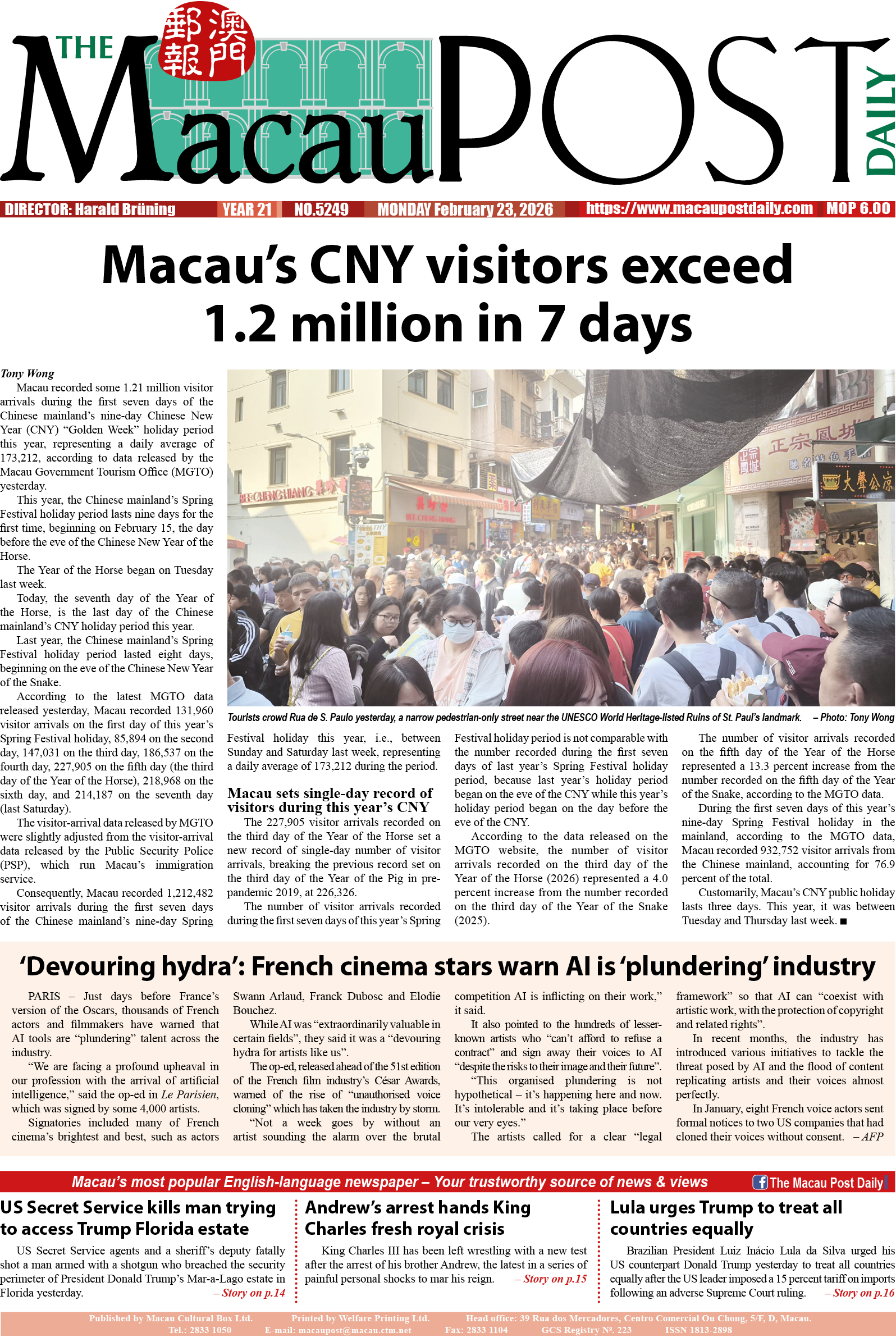Editorial
The State Council’s recent inclusion of three items from Macau on its latest national list of intangible heritage is not only an honour for our city but also a call for action.
The three items – Macanese cuisine, Patuá plays and Tou Tei worship represent Macau’s cultural diversity in terms of its prandial delights, ludic pleasures and folk belief.
The 5th Representative List of State-level Intangible Cultural Heritage Items submitted by the Ministry of Culture and Tourism and released by the State Council on June 10 covers 185 items in total. The five lists comprise 1,557 items including 11 from Macau.
Tou Tei – the God of Earth known in Putonghua as Tudi (“Earth and Ground”) – is ubiquitous in Macau due to its temples, shrines and statues. The tutelary deity is widely worshipped as a guardian, patron and protector of a particular place and the Feast of Tou Tei on the second day of the second lunar month is one of Macau’s most important religious festivals. No doubt, folk belief – together with Buddhism and Taoism – is Macau’s main religion, and it is one of the most important aspects of local culture. The Ministry of Culture and Tourism’s Director of Intangible Heritage Wang Chenyang was right when he pointed out at a press conference in Beijing earlier this month that the listing of the 1,557 items has brought both economic and cultural values to the respective regions over the years.
In Macau, the listing of Tou Tei reaffirms the significance of folk belief in local culture and is also a potential religious money-spinner. The Macau Government Tourism Office (MGTO) should include visits to Tou Tei temples and shrines in its “Stay, Dine and See Macao” itineraries.
As far as Macanese cookery is concerned, I must confess that I am culinarily biased since it is one of my favourite cuisines (others are Thai and Bohemian). Of course, there’s no accounting for taste but as a foodie I am sure that Macanese cooking is one of the best things that Macau has on offer.
Macanese cookery is one of the world’s oldest fusion cuisines, going back to the 16th century, and it should not be confused with the so-called modern fusion cuisine that emerged in the 1980s (such as Californian cuisine). Old fusion cuisines going back hundreds of years can also be found, for instance, in Aruba and elsewhere in the Caribbean.
The listing is also a well-deserved – lamentably posthumous – honour for Aida de Jesus, the doyenne of Macanese cuisine, who passed away at the age of 105 in May. Without “Dona Aida”, as she was endearingly known by her many friends and admirers, Macanese cuisine’s multicultural recipes would hardly have survived to this day. Regrettably, there are only a few local restaurants that specialise in authentic Macanese cuisine such as the aptly named Cozinha Aida. Perhaps, the government could formally require Macau’s casino-hotel resort operators to open at least one Macanese restaurant on each of their premises when drafting their new concession agreements.
Dona Aida was also one of the few remaining speakers of Patuá, the highly-endangered Portuguese-Asian Creole. She loved watching the comedies staged by the “Dóci Papiaçam di Macau” (“Macau’s Sweet Language”) group of amateur actors, directed by lawyer-cum-playwright Miguel de Senna Fernandes.
Patuá plays are a laudable effort to keep the language alive at least on stage. However, much more should be done to ensure that one more language isn’t wiped off the face of the earth. The Macanese community, the government and the local academia must join hands to guarantee its survival. After all, Patuá is an integral part of Macau’s unique Eurasian heritage.
A Patuá textbook is urgently needed to help teach the language. It would be the first ever, and ideally it should be published in Chinese, Portuguese and English versions. I would be the first one to buy it.
Prof. Alan Norman Baxter of the University of Saint Joseph (USJ) has, in my view, the necessary expertise to get such a project off the ground, possibly in conjunction with other Portuguese-Asian Creole scholars, if the required institutional support could be organised. He and Senna Fernandes co-authored a Patuá-Portuguese and Patuá-English dictionary two decades ago.
Money to finance the textbook project shouldn’t be a problem. What’s needed is determination and passion.
– Harald Brüning








